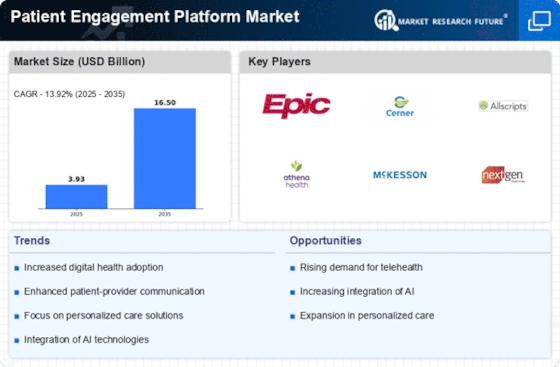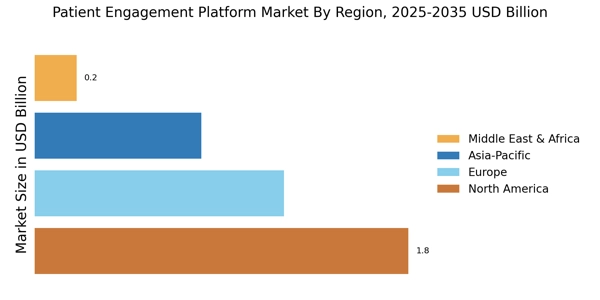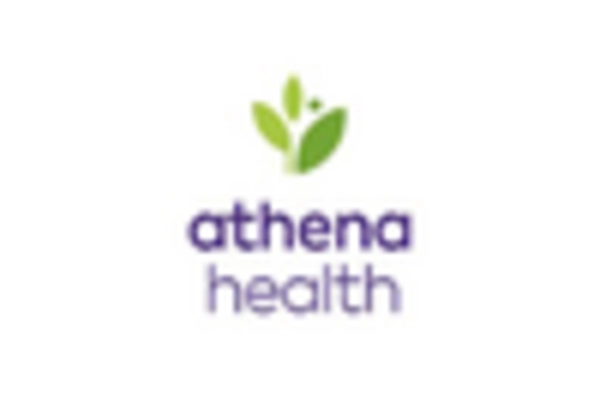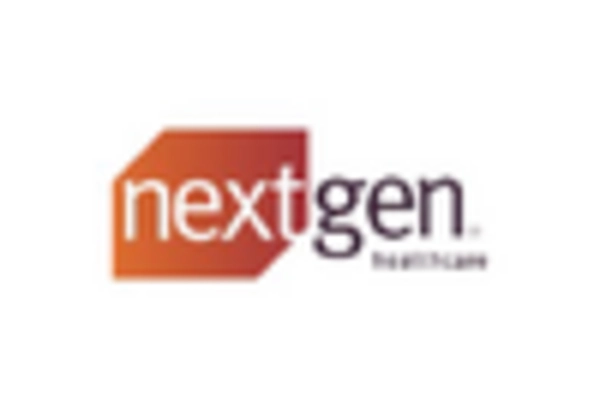Shift Towards Value-Based Care Models
The Patient Engagement Platform Market is experiencing a shift towards value-based care models, which prioritize patient outcomes over volume of services provided. This transition is prompting healthcare organizations to adopt patient engagement platforms that facilitate better communication and collaboration between patients and providers. Value-based care emphasizes the importance of patient satisfaction and engagement in achieving positive health outcomes, leading to a greater focus on tools that enhance patient involvement in their care. Market trends suggest that as more healthcare systems adopt value-based care principles, the demand for patient engagement solutions will likely increase. This shift not only aligns with the goals of improving patient health but also supports the financial sustainability of healthcare organizations, making it a pivotal driver in the patient engagement platform market.
Technological Advancements in Healthcare
Technological advancements are reshaping the Patient Engagement Platform Market, as innovations in digital health tools and mobile applications become increasingly prevalent. The integration of advanced technologies such as artificial intelligence, machine learning, and data analytics is enabling healthcare providers to enhance patient engagement strategies. These technologies facilitate real-time communication, personalized health insights, and improved access to medical information. As a result, healthcare organizations are more likely to adopt patient engagement platforms that leverage these advancements. Market data suggests that the adoption of technology-driven solutions is expected to rise, with a significant portion of healthcare budgets being allocated to digital health initiatives. This trend underscores the critical role of technology in fostering effective patient engagement and improving overall healthcare delivery.
Regulatory Support for Patient Engagement
The Patient Engagement Platform Market is benefiting from increasing regulatory support aimed at enhancing patient engagement in healthcare. Governments and regulatory bodies are recognizing the importance of involving patients in their own care processes, leading to the establishment of policies that promote transparency and communication between patients and providers. For instance, regulations that mandate the use of electronic health records and patient portals are driving the adoption of engagement platforms. This regulatory environment is likely to create a favorable landscape for patient engagement solutions, as healthcare organizations seek to comply with these requirements. Market analysis indicates that the alignment of regulatory frameworks with patient engagement initiatives is expected to bolster the growth of the industry, as providers invest in platforms that facilitate compliance and enhance patient interaction.
Increasing Demand for Personalized Healthcare
The Patient Engagement Platform Market is witnessing a notable shift towards personalized healthcare solutions. Patients increasingly seek tailored experiences that cater to their unique health needs and preferences. This demand is driven by a growing awareness of the importance of patient-centered care, which emphasizes the role of patients in their own health management. As a result, healthcare providers are investing in platforms that facilitate personalized communication and engagement strategies. According to recent data, the market for personalized healthcare solutions is projected to grow significantly, indicating a robust opportunity for patient engagement platforms that can deliver customized experiences. This trend not only enhances patient satisfaction but also improves health outcomes, thereby reinforcing the value of patient engagement in contemporary healthcare.
Growing Emphasis on Chronic Disease Management
The Patient Engagement Platform Market is increasingly focused on chronic disease management, as the prevalence of chronic conditions continues to rise. Healthcare providers are recognizing the need for effective engagement strategies to support patients with chronic diseases, which often require ongoing management and monitoring. Patient engagement platforms are being developed to provide tools that assist patients in managing their conditions, such as medication reminders, symptom tracking, and educational resources. Market data indicates that the chronic disease management segment is projected to expand significantly, reflecting the urgent need for solutions that empower patients to take control of their health. This emphasis on chronic disease management not only enhances patient outcomes but also reduces healthcare costs, making it a critical driver for the patient engagement platform market.

















